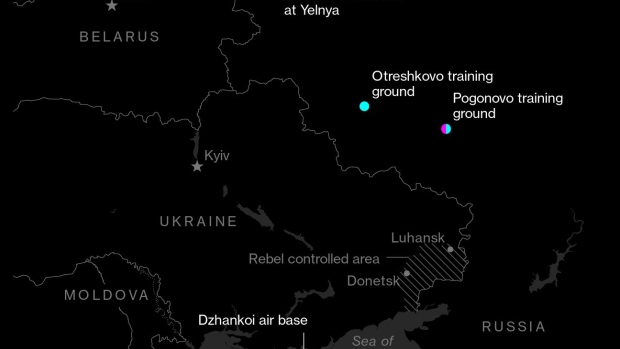Jan 19, 2022
Europe Sidesteps Debate Over Russia Sanctions Despite War Fears
, Bloomberg News

(Bloomberg) -- The European Union is steering clear of a group discussion of specific penalties for Russia if it invades Ukraine, even as it warns Moscow would pay a significant price for an attack, according to people familiar with the matter.
A draft of a joint statement that EU foreign ministers will be asked to adopt on Monday is mostly limited to echoing what the bloc’s leaders agreed last month. That’s despite increased U.S. pressure to settle on a package of sanctions as it steps up warnings that Russian troops could soon move into Ukraine.
The bulk of any EU-wide response would have to be agreed by all 27 member states, and several governments are keen to avoid a group-wide debate for now, fearing it would advertise potential differences, according to a person familiar with meetings this week between senior diplomats. Some states have not yet seen detailed proposals being drafted by the European Commission, the bloc’s executive body, officials said.
The U.S. and the U.K. are among the countries warning that action by President Vladimir Putin could come soon. Russia is still massing troops and equipment on the Ukrainian border, even as it denies plans to invade. Talks involving Russia have failed to make headway as Putin demands security guarantees from NATO in exchange for de-escalating his buildup, and officials in America and Europe say they are still unsure of his true intentions.
Europe’s continued reluctance to discuss specific penalties may only harden concerns in Washington about a unified front with Putin. Some European nations have expressed anxiety that hitting Russia hard could damage their own economies, or perhaps spur Putin to cut off essential gas supplies to them.
The most recent EU draft, which Bloomberg has seen, says that “any further military aggression by Russia against Ukraine will have massive consequences and severe costs.” It says that potential sanctions include “a wide array of sectoral and individual restrictive measures that would be adopted in coordination with partners,” but does not currently go into any detail.
The EU has accelerated preparatory work on potential penalties, it adds. The draft could change before foreign ministers agree to it.
The U.S., the EU and several European governments have held a number of discussions about the specific sanctions they’d adopt if Russia moved against Ukraine. While there is now a broad understanding on general goals -- covering restrictions on individuals, sanctions on banks and financial institutions as well as export controls on advanced technologies and key industries –- there isn’t yet a joint agreement on all the details, two of the people said.
Some major western European governments have proposed exemptions to particular sanctions and introducing financial measures gradually. Those nations have also indicated that cutting Russia out of the international payments system Swift is a no-go. The Biden administration has repeatedly said all options remain on the table.
European and U.S. officials familiar with the discussions said that concrete proposals would be shared only once Russia’s actions are known. Sanctions are reactive and not a deterrent, and their nature and scope would depend on what Russia actually does, an EU official said.
Another person said a package of proposals had largely been prepared.
The backdrop to the talks is growing ever more fraught as Putin shows no sign of wanting to back down despite weeks of frenzied diplomacy. Russia said this week it would move forces to Belarus next month for a series of military drills running until Feb. 20.
Secretary of State Antony Blinken is in Ukraine and heads to Geneva on Friday to meet his Russian counterpart Sergei Lavrov. Blinken has also now been invited to join the EU ministerial meeting next week.
“Our view is this is an extremely dangerous situation,” White House Press Secretary Jen Psaki told reporters on Tuesday. “We’re now at a stage where Russia could, at any point, launch an attack in Ukraine. I would say that’s more stark than we have been.”
The U.S. and its European allies have also discussed the range of possible actions by Moscow that could trigger a retaliation. Aside from sending troops into Ukraine, it could include any effort to engineer a coup against Ukrainian president Volodymyr Zelenskiy or other acts to destabilize his government. They are also looking into ways to mitigate the impact that some measures might have on their own economies, in particular on Europe’s energy imports.
Although the draft conclusions reaffirm the EU’s commitment to support Ukraine in countering cyber threats and tackling disinformation, the bloc’s members have yet to find agreement on what level of military assistance they might provide Ukraine. As the U.K. and the U.S. have shipped defensive weapons to Ukraine, some European nations, such as Germany, have been against arming Kyiv, even with defensive equipment.
©2022 Bloomberg L.P.


